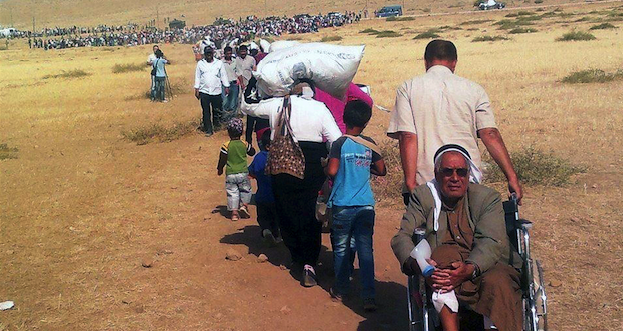Selling Your Soul for Border Control?

The EU and Turkey recently reached a deal to exchange refugees in a so-called “one-for-one” process in an attempt to stem the tide of refugees entering Europe. The point of the deal is to break the people smugglers’ business model and return some semblance of control to the EU. In return for Turkey’s cooperation the European Union has promised to give Ankara €6 billion to help the estimated 2.7 million Syrians now stuck on Turkish soil.
It will also become easier for Turks to get European visas and the EU will give greater consideration to the idea of Turkey becoming an EU member state, long a goal of successive Turkish governments. This deal exists within a grey area of legality and represents one of the first times the EU has made an expedient deal that fundamentally undercuts so much of its previous work on justice, human rights and access to free speech. The EU has entered dangerous territory.
The deal works by allowing the EU to return each refugee that does not claim asylum arriving in Europe by boat after March 20 back to Turkey, and then resettle a Syrian living in a Turkish camp into the EU in exchange. However, if the seemingly endless flow of migrants crossing the Aegean does stop, this mechanism is likely to become quickly irrelevant.
What the EU desperately wants is for Turkey to seal its coastline and stem the flow of refugees. As President Erdogan grows increasingly bellicose and demanding, accusing Jean-Claude Juncker of being personally disrespectful to him and comparing Luxembourg to “a little town in Turkey”, it is hard to escape the feeling that the EU has sold its ideological soul for border control. Indeed, human rights groups say the plan contravenes European and international law.
The EU has capped the number of Syrians who can be rehoused in Europe from Turkey at 72,000 in 2016. This number falls far short of the 108,000 a year recommended by International Aid Agencies. The relocation scheme will be stopped once the ceiling is reached. Given that last year more than 200,000 people arrived in October alone, it is easy to see how far short this cap may fall in meeting the huge demand for resettlement.
The conflict in Syria has displaced approximately 16 million people, with more than 4.8 million currently outside Syria itself. These are mostly in Turkey, Jordan and Lebanon. Bloodshed and conflict have virtually emptied Syria of people, and while the global response – particularly from more developed nations – has been compassionate, it is significantly less than what is required.
A great many people remain marooned in Turkey’s refugee camps and in towns and cities along the Turkish-Syrian border. They are unable to work in Turkey, mostly without money, unable to return home due to violence and are heavily reliant on aid. Many of these refugees have risked everything just to survive, and then risked their lives again in order to reach what many migrants believe is the paradise of Germany. This view is propagated by Internet stories of successful refugees making it to Germany and Sweden, easily disseminated given the prevalence of smart phones.
The deal between the EU and Turkey is the EU’s attempt to discourage any more migrants from making the often-deadly trip across the sea and to regain control of the EU’s borders. The deal has already faced strong opposition. Beyond the legal concern – that a blanket return of foreigners to a third country is not consistent with international law – are escalating fears amongst refugees already in Europe. In Greece last week on the island of Chios violent clashes erupted as refugees broke out of a detention centre and camped at the port to await the arrival of ferries, only to be chased and beaten by exasperated locals. Meanwhile, Syrians and Afghans who are threatened with deportation from Greece have said they would rather take their own lives than be returned, with one Afghan refugee currently being held in the Chios detention centre stating “If they deport us, we will kill ourselves. We will not go back”.
All of this comes as Turkish President Recep Erdogan threatens to pull out of the deal if the EU does not uphold its end of the bargain. President Erdogan is demanding the immediate payment of €3 billion and the immediate start of visa free travel for Turks in the EU. “We have received lots of thanks for our action on the refugees and in the fight against terrorism. But we are not doing this for thanks,” said Erdogan. Turkey is currently hosting approximately 2.7 million migrants at a cost of roughly €10 billion annually, so Erdogan’s concern is justified. However, the brinkmanship he has displayed at negotiations by threatening to “flood” the EU with migrants if his demands were not met only highlights the compassion deficit between the EU and Turkey and stands in contrast to the EUs history on human rights issues.
There is an inescapable feeling in Europe that Europeans are being taken for a proverbial ride by Erdogan, who seems to feel that he can get anything he asks for. The Turkish government recently summoned the German Ambassador to the foreign ministry so that he could explain a satirical music video making fun of President Erdogan published by German broadcaster NDR. It demanded its deletion. Just two days ago the Turkish government filed a formal request for the prosecution of a German comedian, Jan Böhmermann, who read a satirical poem about Erdogan’s suppression of minorities on national television. In an apparent attempt to appease Turkey, Angela Merkel has allowed the government to look into the prosecution on an obscure paragraph of the German criminal code which concerns insulting representatives of foreign states. If nothing else the intervention by Turkey in press freedom issues in Germany just confirms the perception of Erdogan as a thin-skinned authoritarian who cracks down on journalists, the news media and opponents he does not like. It is therefore not surprising that certain sections the EU are wary of becoming too beholden to Turkey.
The EU response to the migrant crisis has largely been a compassionate one. While some countries such as Hungary insist they will not take one migrant, Germany has taken in more than 1 million in the past twelve months: more refugees than Australia has taken since Federation. The scale of the humanitarian disaster unfolding on Europe’s doorstep is enormous and maintenance of the status quo appears unacceptable to all governments involved. However, it is hard to escape the impression that the EU is paying Turkey to keep refugees locked in the camps along the border, abandoning a multitude of EU agreements on human rights and democracy, as well as press freedom, in the process.
Alexander Willox is a Policy Officer at Migration Council Australia, the Commissioning Editor of Insights and a graduate of the University of Melbourne’s Master of International Relations. These views are his own and not those of the MCA. He tweets @frederickcon. This article is published under a Creative Commons Licence. It may be republished with attribution.




